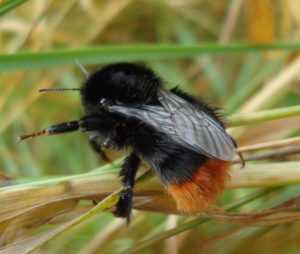Helping farmers and crofters help pollinators
24 June 2016Pollinators including honey bees, bumble bees, solitary bees and hoverflies have an important economic role in farming through pollinating crops. These pollinating insects have declined across much of Scotland, susceptible to loss of their feeding and breeding habitats, use of pesticides, the use of imported bumblebees and the impacts of climate change.
Crofting and organic farming, as with other non intensive farming methods, are more sympathetic to pollinating insects due to the maintenance of more semi-natural areas and less intensive management methods.
Agri-environment schemes offer payments to farmers to help create and maintain flower-rich areas for bees and other wildlife, some measures are supported through greening.
156 farmers and crofters came to 8 on-farm events held to provide practical advice on management for pollinators on commercial livestock and arable farms. Habitats such as field margins, hedges, grasslands, water margins, wetlands, moorlands, scrub, and semi-natural grasslands support a wide variety of wildlife which can be managed to encourage flowering and provide shelter and nesting sites for pollinating insects.
Additionally species rich grassland and grass margins can be sown out using a mix of nectar and pollen rich wildflowers including clovers, scabious, vetches, knapweed. Arable weeds such as corn marigold, which are still abundant in machairs of the Western Isles, are valuable plants for bees and these can be managed to encourage flowering and provide more nectar and pollen.
Both greening and agri-environment schemes have featured in discussions at meetings to help farmers and crofters maintain a viable living as well as providing vital habitats for pollinators.
Conventional farming can help to reduce and reverse declines of honey and bumble bees on crops through use of integrated pest management which has been the focus of crop meetings to look at maintaining pollinators within commercial food production.
Gillian McKnight, Consutlant, SAC Consulting
Sign up to the FAS newsletter
Receive updates on news, events and publications from Scotland’s Farm Advisory Service
